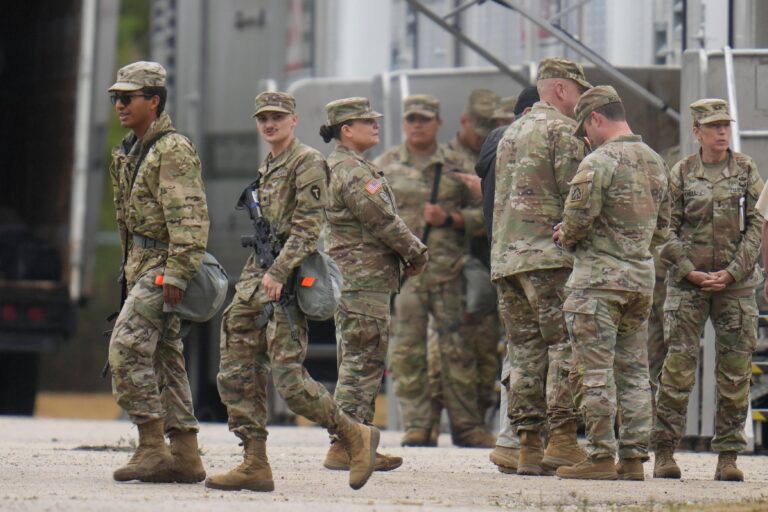Federal Judge Suspends National Guard Deployment to Illinois Amid Trust Issues with Federal Authorities
Judicial Doubts Cast on Federal Credibility in Illinois National Guard Mobilization
In a rare judicial move, a federal judge has issued a temporary injunction preventing the deployment of National Guard troops to Illinois, citing notable concerns about the trustworthiness of federal officials involved in the operation. The judge criticized the federal government’s inconsistent statements and unreliable documentation, which undermined the legal basis for the troop mobilization. This decision underscores the critical need for verifiable and consistent evidence when authorizing military actions that affect state security and public order.
The court’s ruling was influenced by several troubling factors, including:
- Conflicting affidavits submitted by federal agents
- Absence of coherent and detailed operational plans
- Unexplained delays in responding to discovery requests
This injunction sets a significant precedent for judicial scrutiny over federal agencies’ conduct in joint state-federal military operations. Illinois National Guard commanders and state officials have welcomed the ruling, emphasizing the necessity of clarity and accountability before any further troop deployments proceed.
| Issue with Federal Authorities | Effect on Legal Proceedings | Judge’s Remarks |
|---|---|---|
| Inconsistent Testimonies | Damaged credibility of federal case | “Unreliable and deeply concerning” |
| Incomplete Evidence Submission | Insufficient proof to support deployment | “Hindrance to just adjudication” |
| Delayed Discovery Responses | Prolonged case resolution | “Procedural failures unacceptable” |
Legal Foundations Underpinning the Injunction on National Guard Deployment
The court’s decision to temporarily block the National Guard’s deployment to Illinois is grounded in serious legal concerns about federal transparency and adherence to procedural norms. The judge described federal authorities as “unreliable,” highlighting lapses in accountability that necessitate a pause before any military action within the state proceeds. Central to the ruling were constitutional principles emphasizing respect for state sovereignty and the legal boundaries governing military involvement in domestic affairs.
Key legal considerations influencing the injunction include:
- Improper Notification: Federal officials failed to adequately inform Illinois state leaders about deployment plans, breaching established protocols.
- Lack of Substantive Justification: The federal government did not provide sufficient evidence to lawfully support the Guard’s mobilization under applicable federal and state laws.
- Potential Breach of the Posse Comitatus Act: Concerns were raised that the deployment might violate restrictions on using military forces for domestic law enforcement.
| Legal Principle | Explanation |
|---|---|
| State Sovereignty | Ensures Illinois retains control over military forces within its jurisdiction. |
| Due Process | Mandates adherence to legal procedures in federal actions affecting states. |
| Posse Comitatus Act | Restricts federal military involvement in civilian law enforcement activities. |
Challenges and Opportunities in Federal-State Security Collaboration
This judicial ruling highlights the growing friction between federal and state agencies in managing security operations. Labeling federal authorities as “unreliable” exposes vulnerabilities in intergovernmental trust that could delay urgent deployments and erode public confidence in coordinated crisis responses. The situation serves as a stark reminder that robust interaction and accountability frameworks are essential to avoid operational deadlocks during heightened security threats.
To improve collaboration,the following strategies are recommended:
- Developing Uniform Coordination Protocols: Establish clear procedures to streamline decision-making and information sharing.
- Conducting Joint Crisis Simulations: Regular training exercises to enhance mutual understanding and operational readiness.
- Clarifying Legal Boundaries: Crafting explicit agreements that define federal and state roles and limitations in security deployments.
| Identified Challenge | Proposed Solution | Anticipated Benefit |
|---|---|---|
| Federal Inconsistency | Regular status updates to state officials | Enhanced transparency and trust |
| Legal Uncertainties | Formalized intergovernmental agreements | Accelerated troop mobilization |
| Communication Failures | Appointment of dedicated liaison officers | Improved real-time coordination |
Strategies to Enhance Accountability and Communication Between Agencies
Addressing the recent concerns about federal unreliability requires instituting clear, structured communication channels that guarantee transparency and timely information exchange between federal and state entities.Establishing these frameworks will minimize misunderstandings and build confidence in joint operations. Recommended actions include:
- Scheduled inter-agency briefings with thorough documentation
- Designating liaison officers to oversee critical decision points
- Implementing real-time digital platforms to track deployment progress
- Creating self-reliant oversight bodies to monitor compliance and responsiveness
Furthermore, reinforcing accountability through legal instruments that clearly delineate responsibilities and consequences for delays or mismanagement is essential. The table below summarizes key components for strengthening these frameworks:
| Framework Element | Objective | Expected Result |
|---|---|---|
| Memoranda of Understanding (MOUs) | Define roles and responsibilities among agencies | Reduced jurisdictional disputes |
| Communication Protocols | Standardize messaging and information flow | Improved situational awareness |
| Audit and Reporting Mechanisms | Monitor adherence to timelines and procedures | Greater operational accountability |
Conclusion: Navigating the Complexities of Federal-State Military Coordination
The recent judicial injunction, which brands federal authorities as “unreliable” and halts the National Guard’s deployment to Illinois, introduces a complex dynamic into the ongoing discourse on federal-state cooperation during emergencies. As both state and federal stakeholders evaluate the ramifications of this ruling, it remains critical to monitor how this legal intervention will influence future security strategies and governance frameworks within Illinois. Continued dialog and reform will be vital to ensuring effective, lawful, and trustworthy collaboration in safeguarding public safety.





